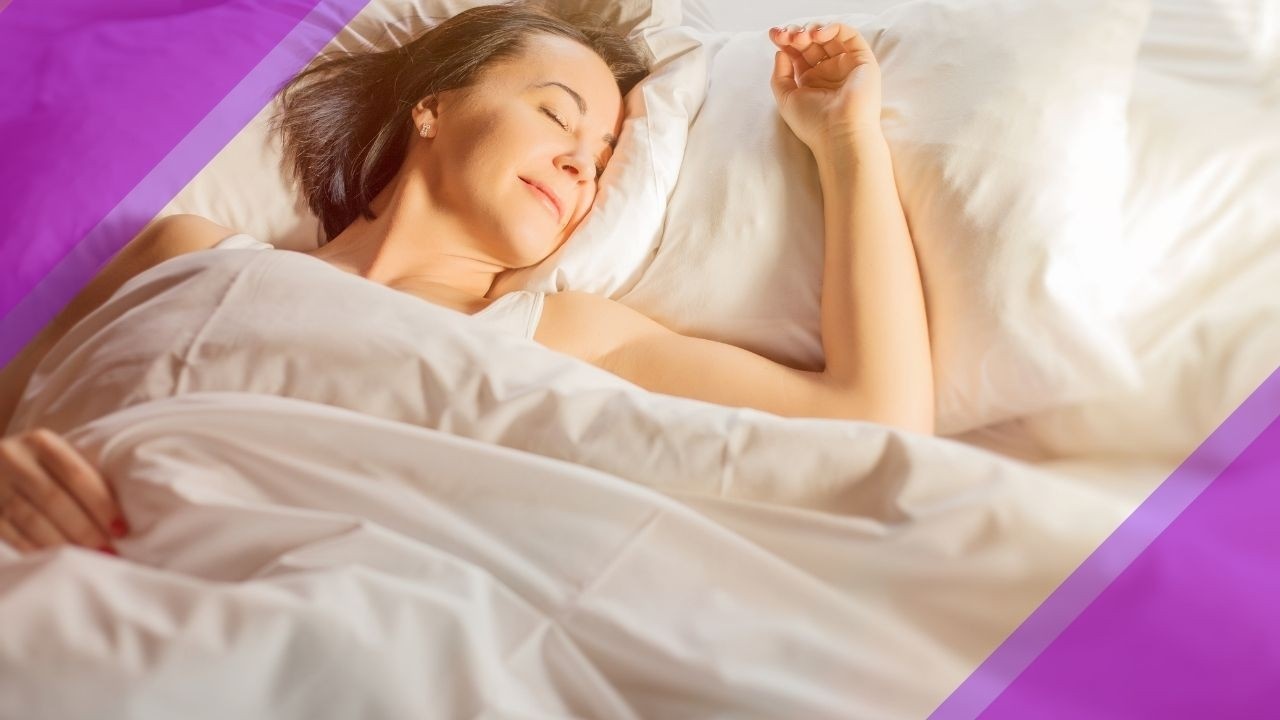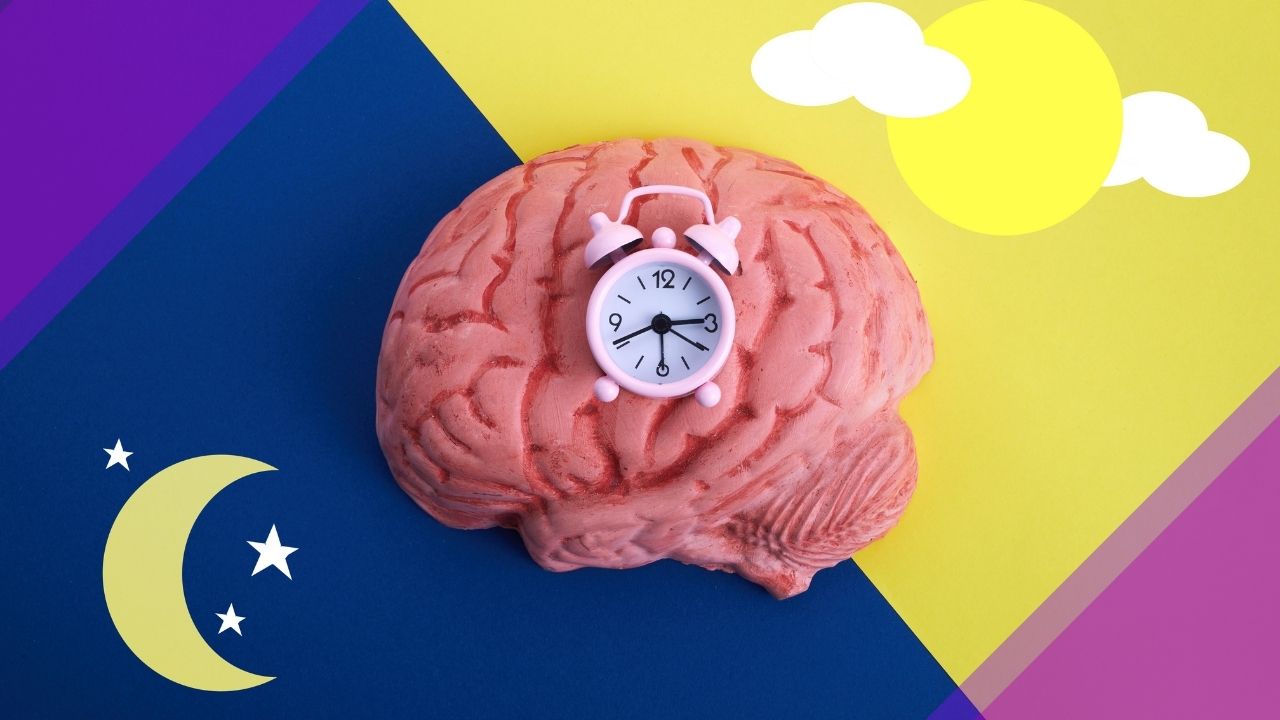
How Much Sleep Do Menopausal Women Need?
May 04, 2022It might be less than you think. Here’s what research shows and how to get a better night’s rest.
By Selene Yeager
Seven hours of shuteye a night may be the sweet spot for mental health and wellbeing in midlife, according to a study of almost half a million adults. That’s on the lower end of the seven to nine hour range recommended by The National Sleep Foundation, and good news for menopausal women who can struggle to get a solid night’s rest.
For the study, which was published in Nature Aging, scientists from the UK and China examined data from nearly 500,000 adults ranging in age from 38 to 73 years. The researchers surveyed the participants on their sleeping patterns, mental health, and well-being, and gave them a series of cognitive tests. Brain imaging and genetic data were available for almost 40,000 of the study participants.
After analyzing the data, the team found that seven hours of sleep per night was the optimal amount of sleep for cognitive performance. Further, it improved mental health, with people experiencing more symptoms of anxiety and depression and worse overall well-being if they reported sleeping for longer or shorter durations. (Which is not to say you should stress out if you do sleep eight to nine hours, especially as an active woman. More than nine hours is, however, linked to poorer health.)
This is good news because as we all know, hot flashes, night sweats, and the 3 a.m. menopausal anxiety monkeys can make it hard to fall and stay asleep some nights. Stressing out about not getting a full eight hours or more can backfire and make sleep worse.
How to Get Better Sleep During Menopause
Some women find that menopausal hormone therapy (MHT) helps improve sleep. Research shows MHT is particularly good for sleep if hot flashes and night sweats are what’s keeping you up, because hormone therapy is especially good for alleviating those symptoms. It’s worth noting that a meta-analysis on hormone therapy and sleep quality didn’t find sleep benefits for women who weren’t being kept up by those types of vasomotor symptoms.
Of course, not everyone can or wants to take MHT. That’s okay. There are ways to save your sleep that don't require a prescription. In fact, we did a whole episode of Hit Play Not Pause on that topic with Dr. Sophie Bostock, where she recommended homing in on three key pillars: circadian rhythms, sleep pressure, and (this is a biggie) stress.
Better Sleep Through Circadian Rhythms
Your circadian rhythm is your internal body clock, or more specifically “clocks”, as Bostock explains. “There are clocks in every single cell in your body. It is hardwired in your DNA to have an internal rhythm to be active during a certain period and an internal rhythm to have a period of recovery,” she says. We are preprogrammed to be more active during daylight hours and to rest and recover at night. Maintaining those circadian rhythms makes it easier to have a good night’s sleep. Here’s how.

Wake up at the same time. “One of the core things you can do to strengthen your circadian rhythm is wake up at the same time every day. It helps to anchor our clocks,” Bostock says. Even if you haven’t had a good night’s sleep, getting out of bed within 30 to 60 minutes of the same time every day will help your body get into its natural sleep/wake cycle.
See the light. Exposing yourself to bright light in the morning is key to staying in sync with your innate clock. “Try to get exposure to outside light in the morning,” Bostock says. A window works fine, but outdoors even for a few minutes is best. “Our circadian body clock is incredibly sensitive to differentials in light intensity,” she says. Even on an overcast day, outdoor light exposure helps.
Eat early. Have some food within an hour of waking up. Even just yogurt and some fruit signals to your circadian clock that you’re going to ramp up your energy and get the day going. Try to eat dinner no later than 7 or 7:30. If that’s not possible, plan your dinnertime so you have two hours between dinner and bedtime. That gives your body time to digest and wind down and get the signals that the day is done.
Easy on alcohol. Alcohol can push your circadian rhythm back, Bostock says. “We’ve all been to a party feeling a little bit tired and then you have a few drinks and it’s like a second wind.” Alcohol also disrupts your sleep architecture, so you’re more restless in the early morning hours.
Try tart cherry juice. Drink an ice-cold glass of Montmorency tart cherry juice 30 minutes before bed. This is a favorite tip from female physiology researcher Stacy Sims, Ph.D., author of Next Level because it enhances your body’s production of melatonin--a key hormone for regulating sleep and for helping the body cool down enough to trigger optimal sleep. Menopause is associated with a significant reduction in melatonin. Research shows that older women (and men) slept better and for longer when they drank it before bed.
Let Your Sleep Pressure Build
That drowsy, head-nodding feeling you get when you’re tired is called sleep pressure. It’s the product of a buildup of a chemical messenger in the brain called adenosine. The longer you are awake and active, the more adenosine builds up. The only way to get rid of adenosine is to sleep it off. To maintain healthy nighttime sleep pressure:
Curtail the caffeine. Caffeine works by masking the adenosine receptors in your brain, so it doesn’t recognize that sleep pressure is building. (It’s also why you have a big crash after the caffeine wears off and all that adenosine hits you like a sleep bus.) Caffeine has a half-life of about five to six hours so go especially easy in the afternoon hours.
Cap naps at 30 minutes. Naps are effective because you burn off some of the adenosine and relieve that midday sleep pressure. But drifting off for an hour or so in the middle of the day is counterproductive because you won’t have enough sleep pressure built up for the end of the day. Keep your naps under 30 minutes.
Push back your bedtime. If you’re not falling asleep or settling into a deep sleep, you may want to push your bedtime back, at least temporarily, until you are genuinely tired, says Bostock. “It’s one of the most powerful things you can do to actually improve the depth of your sleep through the night.”
Ease Stress for Better Sleep
Stress drives up adrenaline and cortisol, which increases your breathing rate and sends glucose into your bloodstream for energy. No matter how tired you are, stress will override the other two sleep systems, so even if you manage to fall asleep, you aren’t likely to stay asleep. That’s an evolutionary advantage, Bostock says. “If you were super tired but happened to be surrounded by a pride of lions, it would not be good for your survival to fall fast asleep.”
Cortisol levels can naturally rise during menopause and menopause itself can be stressful, setting us up for a negative cycle where stress and menopause and sleep problems amplify each other, Bostock says. To tame stress and keep the lions at bay:
Take a mental time out. A bit of nothing time is essential for stress management. So, whether you meditate or sit outside and stare at the sky, take 10 to 15 each day to do absolutely nothing. “A lot of women are running around at 300 miles per hour all day and when they get into bed that’s the first opportunity their brain has to catch up and process everything,” Dr. Bostock says. “Block out 15 minutes of the day—put it in your calendar—where you are going to do nothing.” This also trains your brain to fall into relaxation on cue, so you’ll be better able to wind down when it’s time for bed.
Use your breath. Deep breathing activates the vagus nerve and helps you move out of a sympathetic (fight or flight) state and triggers parasympathetic (rest and digest) activity. The North American Menopause Society (NAMS) recommends practicing this simple breathing exercise a few times a day:
Sit in a straight-back chair with both feet on the floor.
Rest hands on the abdomen.
Slowly count to four while inhaling through the nose and feel the abdomen rise.
Hold that breath for a second.
Then, slowly count to four while exhaling through the mouth — let the abdomen slowly fall.
Repeat this exercise 5 to 10 times
Keep Your Cool
Finally, cool temperatures — for both your bedroom and your body — promote quality sleep. “Your body needs to cool by a couple of degrees to get into a deep sleep,” Bostock says. “So, anybody who’s experienced temperature fluctuations or night sweats and hot flashes is going to know that it becomes much harder to fall into a deep sleep.”
Bostock recommends a warm bath, which sounds counterintuitive, but works like a dream (pun intended). “When you step into a warm bath, the temperature of your skin starts to increase. That means your body is sending more blood flow to your extremities, which helps to cool down your core body temperature,” she says. So, you’ll be able to drift asleep more readily when you’re snuggled up in your cool room.
Don’t want to draw a full bath? Research shows that submerging your soles in a foot bath before bed can reduce disruptive menopause symptoms and lead to a better night’s rest.
Get Feisty 40+ in Your Inbox
We hate SPAM. We will never sell your information, for any reason or send you emails that suck!

